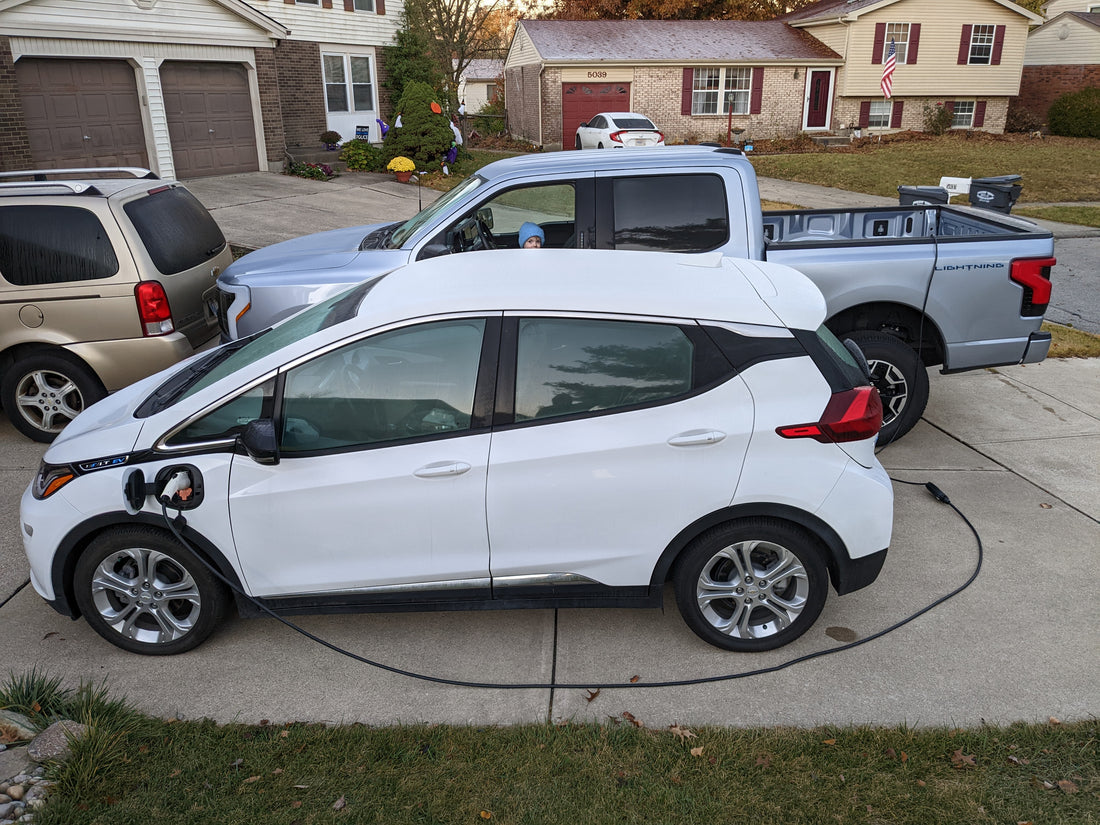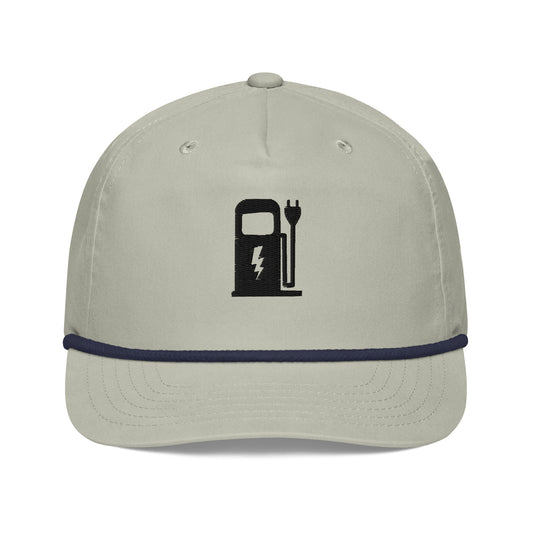
Interview with a Charging Solution Architect
Interview with a Charging Solution Architect
We had the opportunity to sit down with Ned Funnell, an experienced electric vehicle professional with an extensive background in working with chargers ranging from 1 to 500kW and EVs that include everything from unicycles to buses and Class 8 trucks. As an EV owner since 2014, Ned currently serves as a Charging Solutions Architect at Electrada, further expanding his expertise in the field.
ME: Can you provide an overview of your background and experience in the EV industry?
Ned: I'm Ned Funnell, a long-time EV enthusiast and professional. I've been an EV owner since 2014, and my interest in electric power goes way back to my high school days when I was into RC combat robots. The power of electric motors has always been appealing. When EVs started hitting the scene around 2010-2011 with the Leaf and the Volt being announced, I got excited. At the time, I was working in welding engineering and did some work with an NGO. When I wanted to pivot back into engineering, I decided to get into EVs and found my way to Proterra as a field engineer. That was a great launch, but I wanted to get to the Midwest. So now, I am with Electrada here in Cincinnati, focusing on the charging architecture for our charging as a service offer.
ME: For those who might not know, can you give an elevator pitch on what Electrada does?
Ned: Sure. Electrada offers what we call 360 Charging as-a-Service. The idea is that for fleets and organizations looking to electrify their fleet and facing the challenge of adding all the infrastructure they need to charge their fleet, we come in as specialists. We not only provide a solution, but we also fully capitalize the costs of that solution. So, the customer simply pays nothing upfront, only for the energy at a guaranteed rate over a five to ten-year period. That includes absolutely everything from design and installation to maintenance and energy. We handle everything from A to Z to ensure their EV fleets are ready to hit the road, and they can focus on their fleet operations without worrying about all the moving parts involved in keeping them powered.
ME: Can you explain what a Charging Solution Architect is?
Ned: Sure. Here in Cincinnati, we have a charging lab where we bring in the hardware we're looking to integrate into our solution. We put it through a process where we filter out what we're not going to consider, evaluate what remains, and do testing in our lab to figure out which hardware is viable. After picking the best candidates, we test more to find the edge cases and determine if it’s a fit to our solution as a whole. Once we've determined that the hardware is something we’re ready to stand behind, we do all the work to integrate into our solution and make it available for our engineering team to use in customer projects. We have an uptime guarantee, meaning that we guarantee our chargers are going to be performing 99% of the time or better so that customers always get a charge. I run the charge lab here in Cincinnati, which means physically testing hardware. Recently I energized two different DC chargers on the same day and connected them to charge management systems. We handle not only the hardware aspect but the complete solution that includes the connection to charge management- that can be used to manage energy flow in real time based on the fleet’s needs and site constraints.
ME: What kind of EV do you have now? And do you have any on order?
Ned: I drive a 2017 Chevy Bolt, and it's a lovely vehicle. I have also had a Volkswagen e-Golf and taken it on some adventures out west. I had only the 24 kWh version, but I was able to take it all over Utah. Driving an 80-mile range to Ohio when I moved just wasn’t going to happen, and I switched to the Bolt. Before that I had a Volt, but my very first EV was a DIY converted electric motorcycle. I’ve also dabbled in ebikes and even got an electric unicycle- but I don’t have the balance for that!
ME: Do you have any new EVs on order or are you sticking with the Bolt?
Ned: Just a couple of months ago, I decided to stick my toe in the water on pre-ordering. I've got a reservation in for an Aptera that I put in just a couple of months ago. It'll probably be a while before production starts and my number comes up. I’m a fan of solar and have PV on my roof, but I am a bigger fan of efficiency. This seems to be a promising possibility to have a highly efficient EV, solar or not.
ME: What's the longest road trip you've done in the Bolt?
Ned: I took it to Florida and back late last year. So from here in Cincinnati to Florida, I don't know how many miles that is, maybe close to 2000? That was a long one. We went all the way down to Miami and saw the Everglades and then back up. So a couple of thousand miles, I think.
ME: In your opinion, what's the most underrated feature or aspect of electric vehicles that people should be most excited about?
Ned: I think one thing that's a little bit hard to convey until someone has really gotten to see and spent some time in an EV is the lifestyle change. With an internal combustion vehicle, there's all this complexity, like being a machine operator. With an EV, it's like my transportation appliance, and I only need to worry about it as much as I have to worry about my dishwasher. It just does its job and does it well. I plug it in when it needs to be charged. I don't have to worry about all the maintenance and headaches of the internal combustion engine. No more spark plugs, belts, etc., it’s nice simply not worrying about that. I feel like it's a lifestyle upgrade to take a lot of things off my mind.
ME: Imagine you have the power to create your dream EV. What unique features would you incorporate to make it your dream EV?
Ned: You know, there are so many good vehicles on the market right now that there's not like a killer feature I feel isn't out there in the market. There's a lot of really great stuff happening with fast charging, long range, autonomy, etc. I feel like basically anything that you need is represented in at least one model out there, but I'm looking forward to a market with multiple choices for any use case someone might have. But for me, if I had an EV that had really high efficiency but also had fast charging and- particularly- the ability to tow, that’d be my dream EV. I've got a little camper I need to tow once in a while.
ME: Which electric vehicle currently on the market do you believe has the most potential to become a cult classic in the future?
Ned: Hard to say, but I’d go with the F-150 Lightning. I think Ford really hit it out of the park with that one, and it seems like it's going to have a lot of longevity. Just like the rest of the F-150 lineup has for decades and decades, and I think a lot of people might really appreciate that truck long into the future.
ME: Which future EV are you most excited about?
Ned: I just think it's great that there are going to be so many more choices than there were just five years ago. I have to say I'll put my money where my mouth is with the Aptera. It has a lot of potential and really looks like it will make it to production.
ME: What are the most significant challenges facing the electric vehicle market today, and how can they be addressed?
Ned: I think where we are right now in the market is that we're at the very beginning of that ‘early majority’ upswing on the technology adoption curve. I think we're basically past the early adopter phase, and we're transitioning into the early majority. That means the auto industry is going to have to appeal to a lot more buyers- those who have not historically bought the kind of vehicles that have been offered in EVs so far.
This comes right back to what we were just talking about. Do we see more buyers value simplicity and efficiency, or are consumers still going to follow their trends of buying larger and larger vehicles that go beyond what people need? Vehicle sizes are inflated by what the automakers want to sell rather than what consumers might choose if they were free from marketing influence, where automakers sell them on a need, not a solution. What car might they really might want in a vacuum?
So, I think there is inherently going to be a bit of a shift that happens- Automakers are catering to consumer preference now, but with all the decades of consumers being taught to want larger, bigger, more vehicles, whether it's as a status symbol or for a certain perception of safety. That’s not necessarily real safety either, certainly not for everyone on the road or people around their vehicles. I think there's going to be a certain point at which that trend of larger, bigger, or more is going to find a natural limit. How do automakers pivot to efficient and electric transportation, but give consumers what they want- after spending many decades telling them that they should want unsustainable options that are always bigger? That is going to be a real challenge, and that's not necessarily something that is intrinsically tied to electrification. Regardless of how they’re powered, we can’t expect good results from putting everyone in the type of vehicle that automakers typically market hardest and profit most from.
ME: What are some emerging trends or innovations in the EV industry that you believe will significantly impact the future?
Ned: Thinking of the EV industry as a whole, I think addressing charging anxiety is going to be an important aspect. There's no way of getting around the fact that complexity is inherently higher in a future with electric vehicles. Transferring liquid dinosaurs into your car is technologically simple and long since solved, while EV charging is complex and new. I think a trend towards simplicity would be helpful. I don't know if I see that trend right now, unfortunately. In terms of something that could have a significant impact, I'll say electrification of familiar vehicles. We've already seen this happen with the pickup truck, as we just talked about, and there are a lot of vehicles out there that are familiar brands, familiar lines of vehicles, like the Blazer EV that’s coming. Those will help buyers who aren't necessarily going to look for an electric vehicle first. They might go shopping for a new Blazer, or just a new Chevy, a new Kia, whatever it may be, and then see there’s an EV option. We still can’t put everyone in an EV the size of a barge, but electrifying what’s already familiar is going to be a helpful next step, I think.
ME: Looking ahead, what do you envision for the future of the electric vehicle industry, and how do you see your role evolving within it?
Ned: I think we're in for a period of both normalization and rejection. Culture has a huge impact on what cars people buy. There's a big difference between selling an EV to someone who wants a transportation appliance and someone who wants a car for how it makes them feel. Those buying based on what the numbers say- fleets, commuters, environmentally conscious folks, etc- they are going to go EV for their next vehicles more and more. I see a large contingent of hold-outs in car enthusiasts, work truck owners, those generally averse to change, and unfortunately those with a different political alignment. EVs won't feel right to them, and I see the persuasion process being slow. As more nephews, neighbors, co-workers, and friends get EVs, though, the message will get out that the water's fine. Hearing a good ownership story directly from a trusted source works so much better than anything else. As for me- I'll be one of those enjoying and sharing about the lifestyle upgrade that is driving electric, and working behind the scenes to get the charging in for fleets. It's an interesting time where different approaches and technologies are fighting it out in the charging market. Figuring out what works best in different applications is an adventure, and will continue to be.
ME: Any last thoughts?
Ned: I think I'll just leave my readers with the advice to try an EV. I know a lot of folks are just waiting on a nudge- here it is. Get behind the wheel of an EV for a few days. Maybe rent one for your next trip, or just to try out locally. Ask EV owners you know about the lifestyle change. If you're in the EV business, there's nothing like the real lived experience of driving electric, and it's a credibility booster to be sure.
Make sure to connect with Ned on LinkedIn. He has some very insightful and educational posts.




